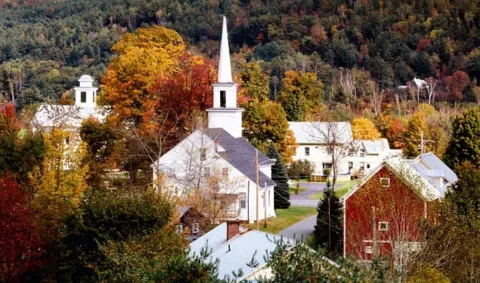
Vermont, known for its picturesque landscapes and charming small towns, offers a unique setting for those considering retirement. Whether you're drawn to its serene countryside or vibrant cultural scene, Vermont has much to offer. In this article, we'll explore key factors such as overall quality of life, cost of living, crime and safety, access to quality healthcare, weather, and culture, comparing each to the national average to help you decide if Vermont is the right place for your golden years.
Vermont consistently ranks high in terms of overall quality of life, thanks to its strong sense of community, clean environment, and abundant recreational opportunities. The state is renowned for its natural beauty, including mountains, lakes, and forests, making it a haven for outdoor enthusiasts. The low population density and lack of urban sprawl contribute to a peaceful lifestyle, with plenty of opportunities for hiking, skiing, and enjoying the great outdoors.
Compared to the national average, Vermont's residents experience lower levels of pollution and enjoy more access to green spaces. The state's commitment to environmental preservation and sustainable living further enhances the quality of life. However, those accustomed to bustling city life may find the pace slower and the amenities more limited.
Vermont's cost of living is slightly higher than the national average, particularly in housing and groceries. While the state does not have a sales tax on clothing and footwear, it does have a relatively high property tax rate. However, the overall tax burden is moderate, with no state taxes on Social Security benefits, making it a tax-friendly state for retirees.
Housing costs vary depending on the location, with Burlington and its surrounding areas being more expensive. In rural areas, housing tends to be more affordable, offering retirees a range of options from quaint farmhouses to cozy cabins. Utilities and healthcare costs are generally in line with the national average, though the colder climate may result in higher heating expenses during winter months.
Vermont is one of the safest states in the United States, with crime rates significantly lower than the national average. The state has a low violent crime rate, with property crime also being much less prevalent compared to other parts of the country. This contributes to a strong sense of security and peace of mind for residents, making it an attractive option for retirees seeking a safe environment.
The tight-knit communities and proactive law enforcement efforts play a crucial role in maintaining Vermont's low crime rates. However, as with any location, it's advisable to stay informed about local safety conditions, especially in more isolated areas.
Vermont offers access to high-quality healthcare, with several reputable hospitals and medical centers located throughout the state. The University of Vermont Medical Center in Burlington is a leading healthcare provider, offering comprehensive services and specialized care. The state's healthcare system is known for its emphasis on preventive care and community health.
Compared to the national average, Vermont has a higher proportion of primary care physicians, which contributes to better access to healthcare services. However, due to the state's rural nature, some areas may have limited access to certain specialists, necessitating travel for specific treatments. Overall, Vermont's healthcare system is robust, providing retirees with the medical care they need.
Vermont has one of the highest overall tax burdens in the United States, consistently ranking among the top states for the percentage of income residents pay in state and local taxes. The state's tax burden includes significant contributions from property taxes, income taxes, and sales taxes, all of which are relatively high compared to national averages.
Vermont’s property tax is particularly notable for its impact on the overall tax burden, as the state relies heavily on this revenue source to fund education and local services. Additionally, Vermont has a progressive income tax system, with rates that increase with higher income levels, adding to the burden on middle- and upper-income residents.
Compared to other states, Vermont’s tax burden is heavier, placing it near the top of national rankings. This high tax burden reflects the state’s commitment to funding public services, but it also means that residents pay a larger share of their income in taxes than those in many other states.
Vermont boasts a rich cultural heritage, with a strong emphasis on local arts, crafts, and traditions. The state is known for its vibrant arts scene, including music, theater, and visual arts. Festivals celebrating local food, crafts, and traditions are common, offering residents ample opportunities to engage with the community and explore local culture.
Vermont's commitment to supporting local businesses and sustainable practices is evident in its thriving farmers' markets and farm-to-table dining experiences. The state's small-town charm and focus on community involvement create a welcoming and inclusive atmosphere. Compared to the national average, Vermont's cultural scene is more intimate and community-focused, making it an ideal place for retirees looking to immerse themselves in a close-knit community.
Vermont experiences a four-season climate, with cold winters, warm summers, and vibrant foliage in the fall. Winter temperatures can be harsh, with significant snowfall, making it a prime destination for winter sports enthusiasts. However, the cold weather can be a drawback for those who prefer milder climates.
Spring and summer bring mild to warm temperatures, perfect for outdoor activities like hiking, fishing, and exploring the state's natural beauty. Autumn is particularly stunning, with Vermont's famous fall foliage attracting visitors from across the country. Compared to the national average, Vermont's weather is more variable, with more pronounced seasonal changes.
Vermont offers a unique blend of natural beauty, safety, and cultural richness, making it an appealing destination for retirees. While the cost of living may be slightly higher than the national average, the state's quality of life, low crime rates, and access to quality healthcare make it a strong contender for those seeking a peaceful and fulfilling retirement. Whether you're drawn to its outdoor activities, vibrant arts scene, or tight-knit communities, Vermont has something for everyone.




